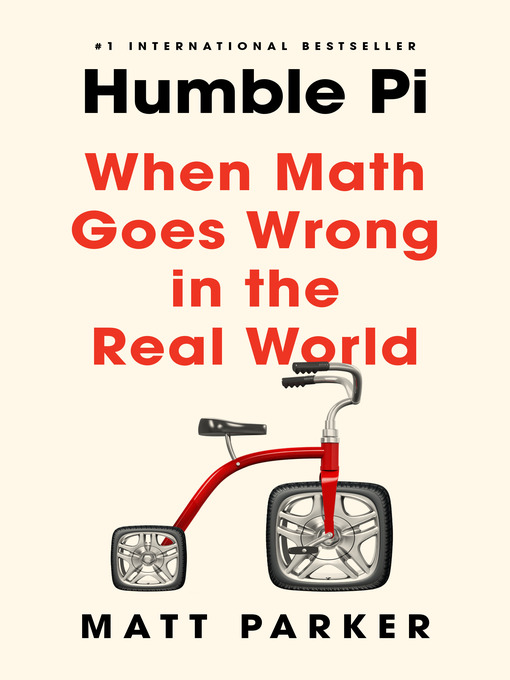
Humble Pi
When Math Goes Wrong in the Real World
کتاب های مرتبط
- اطلاعات
- نقد و بررسی
- دیدگاه کاربران
نقد و بررسی

September 30, 2019
Parker (Things to Make and Do in the Fourth Dimension), a stand-up comedian with a penchant for math, devotes this enjoyable but off-target study to exploring all sorts of mishaps, from the trivial to the deadly, that he attributes to mathematical errors. His examples are at times gripping, such as the Air Canada flight from Montreal to Edmonton that ended in an emergency landing after the flight crew and airport personnel mistakenly calculated its fuel needs in pounds rather than kilograms. The problem is that the most serious errors Parker relates can be more readily explained by carelessness or poor planning rather than a failure to understand mathematics. The trivial, but entertaining, examples he discusses—such as English road signs misrepresenting the geometric pattern on soccer balls, or McDonald’s miscalculating the number of possible options arising from its McChoice Menu (247, not 40,312)—are actually results of mathematical blunders. Parker’s conclusion is thus not about mathematics but about quality control: “Mistakes are going to happen, and systems need to be able to... stop them from becoming disasters.” Those expecting insight into the importance of mathematical literacy from this otherwise intriguing book will be disappointed. Agent: PJ Mark, Janklow & Nesbit Assoc.

October 15, 2019
A pleasant exploration of our deeply held incompetence at mathematics. Comedian and YouTube performer Parker (Things To Make and Do in the Fourth Dimension: A Mathematician's Journey Through Narcissistic Numbers, Optimal Dating Algorithms, at Least Two Kinds of Infinity, and More, 2014), who hosts a show on the Science Channel called Outrageous Acts of Science, claims bluntly that humans are stupid at dealing with numbers. "We were not born with any kind of ability to understand fractions, negative numbers, or the many other strange concepts developed by mathematics," he writes, "but, over time, your brain can slowly learn how to deal with them." Ironically, it is engineering and computer glitches, not pure math, that make up much of the book. Buildings and bridges collapse because someone gets the numbers wrong. A squadron of advanced jets crossing the Pacific suddenly lost their electronics because their navigation computer program, which must keep track of time, couldn't deal with crossing the International Date Line. They followed an older plane nearby to a safe landing. A corporation, searching for an employee named Jack Null, could never find him because "null" to a computer means "no data." People named Blank, Sample, and Test also cause trouble. A number divided by a really tiny number becomes very large. The result of dividing by zero is meaningless; no proper computer will deal with it. Humans yearn to predict the unpredictable; the author shows how a truly random event (a lottery draw, a coin flip) has no influence on the following event. No matter how many times heads appears, the chance of tails remains 50-50. The only way to increase your chance of winning the lottery is to buy more tickets. If black comes up four, five, or 10 times in a row on the roulette wheel, gamblers rush to bet on red because it is "due"--but it isn't. Nonsense, blunders, and delusions make for good reading, so Parker's relentless litany will have a wide appeal. Fun reading for nonmathematicians.
COPYRIGHT(2019) Kirkus Reviews, ALL RIGHTS RESERVED.

December 1, 2019
Parker (Things to Make and Do in the Fourth Dimension) explains how the misuse of math creates problems. Mathematical errors often include mistaking units (pounds for kilograms, feet for meters), and misunderstanding probabilistic and statistical statements. Parker also presents examples of users of computer software not fully understanding the limitations of packaged programs. The only topic that is somewhat technical and requires a bit of effort to follow is Parker's explanation of how the inexactitudes introduced by inputting and outputting date in decimal form leads to problems because the internal computations are actually done in binary. Yet, Parker has a sly wit; so, although all this sounds very serious, in fact, the writing style is breezy and, in some parts, extremely funny. VERDICT A clever, amusing book about some of life's more serious problems; highly recommended.--Harold D. Shane, Mathematics Emeritus, Baruch Coll. Lib., CUNY
Copyright 2019 Library Journal, LLC Used with permission.

























دیدگاه کاربران